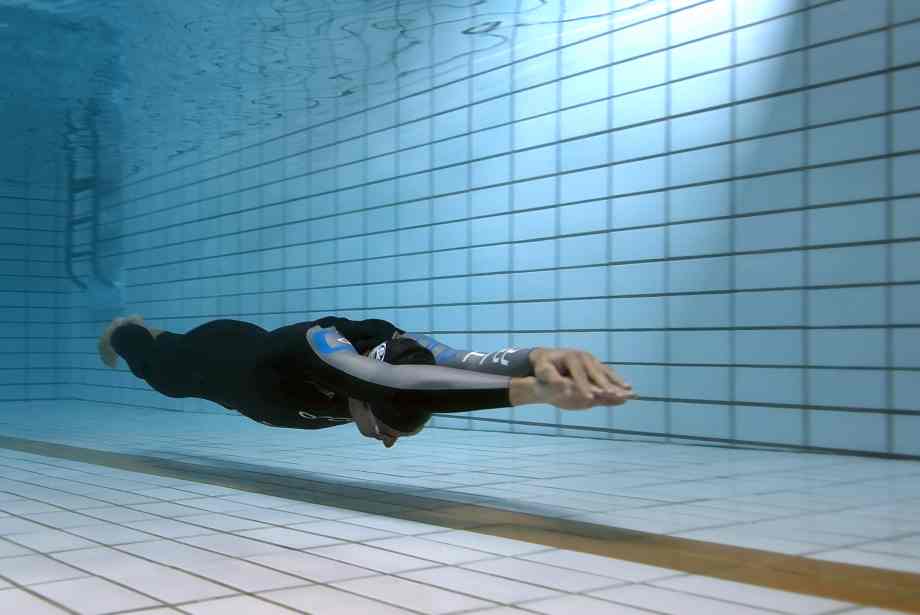- You are here:
- Home »
- Blog »
- Risks of freediving »
- Does Freediving Cause Brain Damage? (and how you can stop it)
Does Freediving Cause Brain Damage? (and how you can stop it)


Does freediving cause brain damage?
Does freediving cause brain damage?
This is something that is often wondered by many beginner and veteran freedivers.
And it’s a perfectly valid question:
Deep freediving puts enormous amounts of pressure on your internal organs…
And to add to the risks: If you don’t track your freediving depth and surface intervals carefully; then you could risk lethal nitrogen bubbles rushing to your brain causing brain damage & severe decompression sickness.
That’s why I always stress to new freedivers how important it is to have a high-quality freediving computer you can trust to help keep you safe from decompression sickness.
Your freediving computer must be able to track your depth with laser-like accuracy and perfectly measure your surface intervals to keep you safe. A good freedive computer is one of the only pieces of gear you shouldn’t cheap out on (better safe than sorry!). Click here to read my post on the best freediving computer to watch your back when you’re deep underwater.
But what if you do follow all the freediving rules safely?
What if you do have a good freediving computer and you do rest the appropriate amount of time during your surface intervals and don’t dive too deeply etc?
Can you still just get brain damage from simply holding your breath during freediving?
As you know, freediving involves constantly lowering oxygen supply to your brain when you hold your breath.
This leads a lot of people to assume freediving causes brain damage. To see whether freediving really causes brain damage, let’s take a closer look at what actually happens to your body when you hold your breath, as it’s a huge part of the sport.
What happens to your body when you stop breathing?
Let’s start by looking at what happens to your brain when you breathe normally:
When you inhale air, oxygen diffuses into your blood and travels to your brain. Your brain then uses oxygen to turn glucose (a fuel source you get from food) into energy. When your brain gets energy, it stays alive and controls endless things in your body like your thinking, your heartbeat, your muscle movements and so on.
But when you hold your breath: your brain doesn’t have enough oxygen to make more energy for your brain and body to work effectively.
If oxygen is cut off for a short amount of time you may have slight trouble focusing, feel dizzy or even pass out. It’s the same feeling you get sometimes when you’ve been sitting or lying down for a while and then stand up too quickly.
In both cases the cause is the same: not enough oxygen in the blood running through your head to your brain.
And when your brain goes too long without oxygen: it becomes starved of energy so you risk brain damage. This can result in loss of speech, inability to move body parts, seizures and/or death.
So…does holding your breath cause brain damage?
Long story short: No, holding your breath cannot cause brain damage. This is because your body has several defense mechanisms in place to protect your brain before brain damage or death occurs.
Such defense mechanisms include:
- Your heart rate drops & blood rushes to your brain and other vital organs to supply them with oxygen. When your brain is starved of oxygen; blood is directed away from less important areas of your body, like your fingers, hands and toes, and toward your brain. This is typically why oxygen deprived people can’t feel their toes, have blue lips (called Cyanosis) and struggle to use their hands properly.
- Rising levels of carbon dioxide force you to inhale more air, preventing brain damage. When you hold your breath, carbon dioxide levels rise in your blood, triggering your urge or reflex to breathe. This reflex and the subsequent intake of oxygen is triggered long before you brain becomes damaged from lack of oxygen.
- You lose consciousness and your body assumes normal breathing patterns. When all else fails and your brain is still deprived of oxygen; it flips an ‘emergency switch’ which causes you to pass out. When you lose consciousness you stop holding your breath and your body automatically inhales air in one last attempt to prevent brain damage and death.
These 3 natural defense mechanisms stop brain damage or death occurring when you hold your breath.
However, there are exceptions, such as if you pass out in an unsafe environment:
Does passing out cause brain damage?
Passing out does not cause brain damage by itself.
But if you pass out in dangerous circumstances, you can get brain damage. The two most common ways you can get brain damage from passing out are:
- You pass out, fall and hit your head badly on a hard surface like the ground or a table, or;
- You pass out underwater. When this happens your unconscious body tries to inhale water instead of air, so you drown and your brain gets damaged from lack of oxygen.
Although passing out or holding your breath can’t cause brain damage; severe lack of oxygen can cause brain damage.
But where do you draw the line? And how long can your brain be starved of oxygen before brain damage?
How long can your brain go without oxygen before brain damage?
This depends on many factors:
- Are you underwater when holding your breath? Your body has something called the ‘Mammalian dive reflex’ which means you can hold your breath longer when underwater.
- Your personal idiosyncrasies: diet, sleep, genetics, age, weight, height, lung volume, lung-packing, water temperature, hyperventilation and so on are all things changing the length of time your brain can go for without oxygen.
- Your breath-hold training: Have you trained your body and brain to function better and use oxygen wisely when levels are low?
- How relaxed you are when trying to hold your breath: anxiously suppressing your urge to breathe will only use up more oxygen causing your breath-hold to become shorter. I suggest listening to relaxation tapes to ‘hack’ your mind to a calmer, more relaxed state before freediving.
All these factors play a big role in how long your brain can go without oxygen before brain damage.
But you’re probably after specific numbers, so here’s a ball park estimate.
(And as usual please don’t take this as professional medical advice. This is purely for educational purposes.)
The average untrained person can go roughly 4 – 5 minutes without oxygen before risking brain damage.
You can expect this number to increase if you’re a trained freediver and/or underwater.
How long can you hold your breath before passing out?
This is difficult to answer. Mainly because this is an area that has not been researched carefully under controlled conditions. And that’s probably because it’s hard (and maybe illegal?) to hire participants and get them to hold their breath until they faint as it can be dangerous and very uncomfortable.
However, here are some rough estimations of how long you can hold your breath before fainting:
- Never trained breath-holding & above the water: 1 – 2 minutes before fainting
- Trained breath-holding & above the water: 1.5 minutes – 3 minutes before fainting
- Never trained breath-holding & underwater: 1 – 3 minutes before fainting
- Trained breath-holding & underwater: Anywhere between 3 – 11 minutes before fainting. Results vary hugely based on type of freediving, experience and other factors as seen above.
Does freediving cause brain damage?
Now you know breath-holding doesn’t cause brain damage and neither does fainting. But what about freediving?
Well, the answer to this question isn’t simple – mainly because there’s a lot of contradictory information out there.
First, let’s look at possible reasons why freediving does cause brain damage:
Freediving boosts S100B proteins in your brain
One study tested 9 competitive freedivers and 6 non-freedivers. These divers held their breath in a dry situation mimicking a static apnea dive. Blood tests showed that the protein often associated with brain damage ‘S100B’ rose after breath-holding. Although this may be alarming, scientists noted the elevated protein levels rapidly disappeared (unlike brain damage victims) and were much, much lower than that of people with brain damage. The short spike in S100B protein was also noted in sports like boxing, running and even swimming, making the findings quite doubtful that freediving (or breath-holding) alone causes brain damage.
Freediving may cause mild neurological damage
Another study was done on 16 professional Swedish freedivers and 5 none-diving adults. The results showed you could be at risk of brain damage when freediving. The group of 21 people were tested among several basic freediving styles and then had their blood samples taken. The findings showed that freediving massively boosts Aβ42 and T-tau biomarkers in blood plasma. This indicated that transient hypoxia from breath-hold freediving may cause mild neurological dysfunction and damage.

Some say breath-hold diving might cause mild brain damage
Freediving may lead to short-term memory loss
A neuropsychological study was done on 12 elite freedivers, 12 beginner freedivers and 12 university students who had never freedived before. The study compared each group’s performance in several neuropsychological tasks. The results showed the elite freedivers performed slightly worse in memory tasks. Overall the study suggests that long-term intense freediving may cause mild, yet long-lasting problems with your short-term memory.
Freediving without safety practices kills brain tissue
A disturbing study done on a Japanese man showed serious brain trauma after repetitive freediving. An MRI scan was done on the man’s brain after 2 hours of continuous freediving. The scan showed small areas of dead tissue due to lack of blood supply. The end result was the man lost touch in his right cheek, foot and hand among other effects.
It’s important to note, however, this study in itself does not prove breath-hold freediving causes brain damage. Most likely the reason the man got brain damage is because he was diving between 40 – 80 seconds duration, with surface intervals of just 20 – 30 seconds.
This is a huge violation of freediving best practices. It’s strongly recommended that divers wait on each surface interval twice as long as the previous dive. Make sure you have a good freediving buoy to rest on during your surface interval, so you’re not tempted to cut your surface interval short and risk brain damage!
Overall, the Japanese man damaged his brain because he was waiting only about half as long in his surface intervals as the length of the previous dive. This stopped much needed oxygen flooding to his brain and massively boosted his chances of decompression sickness and deadly nitrogen bubbles rushing to his brain.
Does freediving cause brain damage? Here’s possible reasons why it does not
Here’s the evidence why freediving doesn’t cause brain damage:
Elite freediver’s brain scans show no difference to non-freediver’s brain scans
Guillaume Nery is a famous 35 year old French freediving champion and multiple record holder & breaker. The French champion got a MRI scan done of his brain by professor Steven Laureys and the Coma Science Group.
The results showed that after 20 years of intense, competitive freediving and training as well as thousands of freedives…Guillaume’s brain appeared completely normal with no brain damage.
Breath-hold freediving does not impact your brain’s mental performance
A study done on 21 professional freedivers measured their neuropsychological responses against the average person. The exam tested things like their speed to understand language, attention to visual cues and much more. The end result was that after 1 – 20 years of intense breath-hold freediving; the freedivers scored no differently in their neuropsychological tests than average non-freedivers did. In other words, the results of the test show that repeated lack of oxygen in the blood and to the brain induced by freediving does not hurt the brain or lower your ability to perform normal mental tasks.
Tying it all together: does freediving cause brain damage?
As you can see; the evidence that freediving causes brain damage is very scattered.
The results from studies are often super contradictory. Or when a strong conclusion is drawn, it’s often found that other variables could be changing the final result. It’s important to note that freediving as a sport is very niche, unusual and quite new to the public. For this reason, there isn’t a great deal of high-quality, extensive studies you can read about regarding brain damage from freediving.
For this reason the best answer here is: there isn’t enough evidence to confidently say whether freediving does or doesn’t cause brain damage.
But I will say that freediving has been around for thousands of years. And, tens of thousands of people who freedive all around the world, year round. Surely if there was really a connection between freediving and brain damage, wouldn’t we would have heard about it?
But one certain way freediving can cause brain damage, is if you blackout under water (lose consciousness), and inhale water and drown.
For this reason you should always freedive with a safety buddy who can bring you to the surface and resuscitate you in the case of a blackout. Also, it should go without saying that for your own safety, you should always take a certified freediving training course before starting freediving (if you’ve never done it before).
Another way freediving can cause brain damage is if you dive too deeply, too often in a single day and get decompression sickness. This can cause deadly nitrogen bubbles in your blood to rush to your brain and cause severe brain damage. Make sure you get ample rest during your surface interval, and track it meticulously using your freedive computer.
But if you follow common freediving safety guidelines, your chances of getting brain damage from decompression sickness are incredibly low.
Positive effects of holding your breath
Here are some of the possible positive effects of holding your breath:
- Boost willpower & discipline
- Increase your ability to deal with stressful events
- Trains your body to conserve oxygen (so you can hold your breath longer)
- Boosts CO2 which can protect brain cells, have anti-inflammatory effects, improve digestion and much more
- Can boost fitness
- Boosts circulation & red blood cell count
- Elevates cancer protecting protein ‘P53’
- Can lower anxiety, depression and boost confidence
About the Author Gerrie van Niekerk - Apnealogy
Gerrie is a passionate Freediver, Spearfisher, Digital Marketer, and author for the Apnealogy website. Gerrie is an SSI Level 1 certified Freediver who loves geeking out about freediving and spearfishing gear and lives for his family and adventure.


